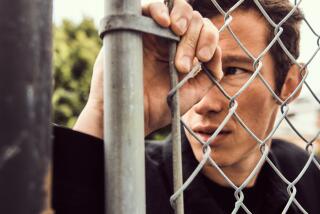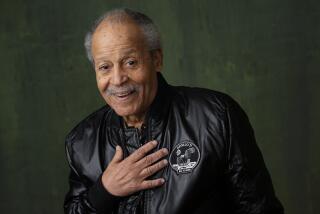History calls them -- again
For years, Robert Searcy tried to forget serving as a Tuskegee Airman during World War II. Sometimes, he thought of his service in the segregated military as two years, 10 months and 27 days lost.
He had hoped to become a doctor but enlisted instead at the end of 1941. He never trained as a pilot; like the majority of the 16,000 African American airmen, he was support staff, a clerk in military intelligence.
After the war, Searcy dropped out of college. He moved from job to job, cleaning planes for United Airlines, working at a downtown Los Angeles post office and selling women’s clothing.
He and his wife never had children, and she died in a car crash in 1990.
He never bothered to join national airmen’s groups, skipped their award ceremonies and movie premieres and stuffed his military honors away in a dog-eared envelope.
Then last month, President-elect Barack Obama invited the more than 300 surviving airmen to his inauguration.
About 16 airmen from Los Angeles claimed tickets, including Theodore “Ted” Lumpkin, 90, president of the Los Angeles chapter of , Tuskegee Airmen Inc., a national airmen’s group.
Searcy, 87, searched his Van Nuys apartment, fished out his discharge paperwork and gave it to the airmen’s group, which confirmed he is a “DOTA” -- Documented Original Tuskegee Airman.
Now Searcy is preparing to join the other airmen traveling to the inauguration, where they will sit up front, near former presidents and members of Congress, and share memories, good and bad.
“It’s too good to give up,” Searcy said. “It’s just like why I volunteered for the military. In your life, you do things you feel are meaningful to everyone.”
Before he enlisted, Searcy had been unaccustomed to segregation, having grown up the grandson of a prosperous landowner in East Texas. He got his first taste after basic training at Ft. Hood, Texas, when he was selected to lead a group of airmen to Tuskegee, Ala.
As he stood in uniform on the dusty, wind-swept platform, porters told him that his men would be confined in their train car for days, barred from the Pullman car’s dining and sleeping quarters.
“I demanded that they give us equal passage to get there, off and on, to eat and sleep with the rest of them,” he said. “They was shocked and surprised.”
The porters, who were mostly black, eventually relented.
Looking back, Searcy says he had to speak up.
“I was put in charge of those men,” he said. “I felt I had to represent what the Constitution was for those men. That’s what leadership is.”
He went on to serve in Italy and was honorably discharged Oct. 27, 1945, with commendations for supporting combat missions over Europe, North Africa and the Middle East.
Now Searcy no longer wants to forget the past. He said he owes it to comrades who have died -- “Lonely Eagles,” the airmen call them -- to stand beside the nation’s first black president, to embrace his past and claim his place in history.
“The next generation need to see something different, a change from what it was, what it used to be,” Searcy said. “And he represents that change.”
Roger “Bill” Terry, 87, earned his silver pilot’s wings on Feb. 1, 1945, becoming a second lieutenant. In a black and white photograph taken as he graduated, the Los Angeles native has his leather aviator’s jacket unzipped to reveal his uniform, with pilot’s goggles shoved high above his cleanshaven face. He is smiling, calm.
Beneath the surface, he and other airmen were seething.
Army regulations forbade segregation at officers’ clubs, but white commanders found ways to shut blacks out.
It did not seem to matter how many black troops had served before: 404,000 during World War I; 186,000 in the Union Army during the Civil War; about 5,000 in the Revolutionary War.
Tuskegee Airmen, whom the Germans nicknamed “Black Birdmen,” had shot down more than 100 enemy planes in Europe.
By March, Terry and his 477th Bombardment Group were transferred to Freeman Field in Indiana, where the main officers’ club was reserved for whites. Blacks, who despite their rank were considered “trainees,” had to use a rundown club.
Outraged, Terry and other pilots nicknamed the black club “Uncle Tom’s Cabin” and plotted to integrate the white club.
“We had always been fighting, all the time we were in the Army, for equal rights -- not just to go to the officers’ club, but equal rights for promotions,” Terry said.
On April 5, 1945, Terry helped 2nd Lt. Coleman A. Young, future mayor of Detroit, send black airmen over to the club, three at a time. Military records show a white officer, 1st Lt. Joseph D. Rogers, armed with a .45-caliber handgun, was sent to protect the club. When 19 airmen forced their way past Rogers, they were arrested.
Later that night, 16 more black airmen, including Terry, approached the club. Rogers stopped them at the door. As Terry recalled, “I says, ‘Why can’t we come in?’ He says, ‘Well, you’re not a member.’ ”
Terry was undeterred. He stepped into the club and was arrested.
No one was injured, but Rogers reported that Terry and two other officers shoved him. In all, 162 black officers were arrested during the protest that came to be known as the Freeman Field Mutiny.
Only Terry and two others received general courts-martial. It was a high-profile case at the time. Future Supreme Court Justice Thurgood Marshall directed their defense.
The two other officers were acquitted. Terry was acquitted of disobeying an order but convicted of “jostling” an officer. He was fined $150, reduced in rank and dishonorably discharged in November 1945.
He never flew overseas.
Terry returned to Los Angeles, met a librarian, Anna, married and earned his law degree in 1949. But the UCLA graduate had trouble finding a job. “Your race determined where you were going to get a job,” he said.
He went to work as an investigator with the Los Angeles County district attorney’s office and, later, with the county Probation Department. The couple settled in Inglewood and had two sons, then two grandsons.
In 1972, Terry helped found Tuskegee Airmen Inc. to draw attention to their history. The group now claims 330 members and has a museum in Detroit.
On Aug. 2, 1995, more than half a century after he left the military, the Army finally pardoned Terry, restored his rank and refunded his $150 fine.
“That is the benefit of being a nation of laws,” he said. “They sometimes catch up with you if you’re right.”
On March 29, 2007, Terry and several other airmen, as a group, received a Congressional Gold Medal from President Bush in Washington.
Standing in the living room of his home in Inglewood this month, Terry removed his replica of the medal from a blue velvet case and turned it over in his weathered hands.
On one side, young airmen in profile, on the other, the red-tailed B-25 they flew, and an inscription: “Outstanding combat record inspired revolutionary reform in the armed forces.”
Although he’s not sure he will be healthy enough to attend the inauguration, Terry requested tickets. His eyes gleam as he contemplates the event, determined as the young man who forced his way past an armed officer more than 60 years ago. It is the same look Searcy gets when he recalls his train ride to Tuskegee.
“Obama mentioned the fact that we were instrumental way before Rosa Parks and Martin Luther King in the civil rights deal,” Terry said. “I’d just like people to know that.”
--
molly.hennessy-fiske @latimes.com
Tuskegee Airmen Inc. -- www.tuskegeeairmen.org -- is still raising funds to send airmen to the inauguration.
More to Read
Sign up for Essential California
The most important California stories and recommendations in your inbox every morning.
You may occasionally receive promotional content from the Los Angeles Times.











